This post may contain affiliate links. Please read my privacy policy.
Braised Abalone with Sea Cucumber Recipe - This recipe so easy and DELICIOUS to homemade!
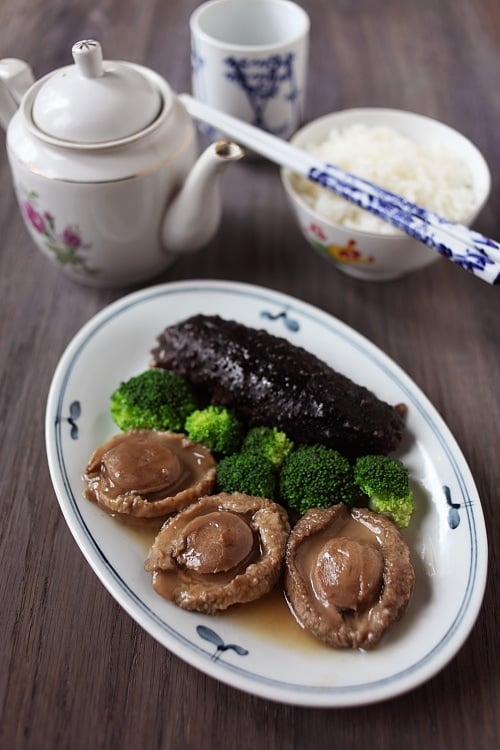
In early 2008, I shared my thoughts about Chinese and the foods that we consume in my version of Maslow’s Hierarchy of Needs (for Chinese people), in which I categorized the foods that Chinese eat into 4 categories.
I love eating expensive Chinese food, such as abalone, fish maw, geoduck, hairy crab, etc.
Most of the time, I indulge in these Chinese delicacies during very special occasions, for example: my birthday or Chinese New Year, or when I visit my uncle in Hong Kong, during which he would feed me with various delicious and extravagant Chinese dishes.
However, I have never attempted to make these type of foods at home, until very recently as my high-school friend sent me a package consisting of South African dried abalone, sea cucumber and Japanese dried scallop.
With such an expensive care package and my eternal craving for braised abalone and sea cucumber, I knew that it was time I learn the master Chinese cookery skills of making these Chinese delicacies.
I reached out to my uncle and asked for the detailed instructions and embarked on a 4-day (yes, four days!) cooking process of making the braised abalone with sea cucumber you see here.
For people who love abalone and sea cucumber (read: me), this is one of the best things to eat in haute Chinese cuisine.
And as with other extreme Chinese delicacies, the preparation is meticulous and the end result has to be pure perfection.
Now if you are not familiar or have never tried these ingredients (they are not the most photogenic creatures), you would be puzzled as to why I would spend so much time making this dish.
But, you see, we are talking about abalone and sea cucumber, which are two of the most prized commodities in Chinese cuisine.
Walk into any lavish and upscale Chinese restaurants in China or Hong Kong and you will see them on the first page of the menu, with very expensive price tags next to these dishes.
For example: in a moderately-priced Chinese restaurant in Irvine, they sell abalone (just abalone) for US$20 per ounce, and the smallest abalone will easily cost you $100, for only one abalone with some sauce.
Braised abalone with sea cucumber is an uber expensive and pricey dish, so what you see on the pictures here will probably cost you $500!
You get the idea.
The preparation includes four steps:
1) soaking the dried abalone and sea cucumber separately
2) cleaning them properly and thoroughly
3) preparing the supreme Chinese stock
4) slow cook the abalone and cucumber until perfection.
And that takes 4 days!
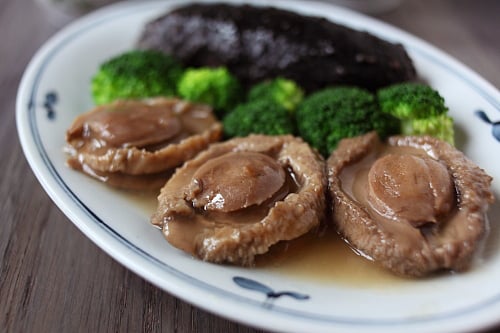
Suffice it to say, this braised abalone and sea cucumber recipe was one of the most testing recipes that I had undertaken, but oh boy, was I glad I did it.
At the first bite of the abalone and sea cucumber and the first taste of the extremely flavorful sauce, I was transported to Chinese food nirvana.
And then I ate another abalone, and then another one, and finished all four of them plus the two sea cucumbers and scallops.
That was what I call supreme culinary satisfaction and gratification.
Frequently Asked Questions
This recipe is only 333 calories per serving.
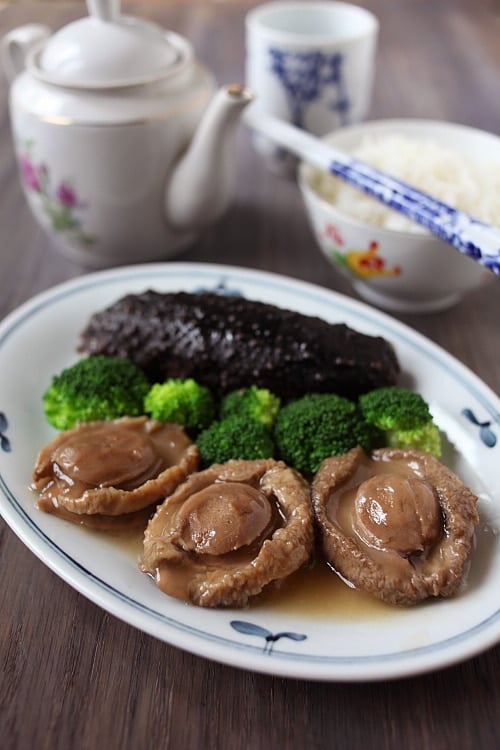
What To Serve With Braised Abalone With Sea Cucumber
For a wholesome meal and easy weeknight dinner, I recommend the following recipes.
I hope you enjoy this post as much as I do. If you try my recipe, please leave a comment and consider giving it a 5-star rating. For more easy and delicious recipes, explore my Recipe Index, and stay updated by subscribing to my newsletter and following me on Facebook, Pinterest, and Instagram for new updates.
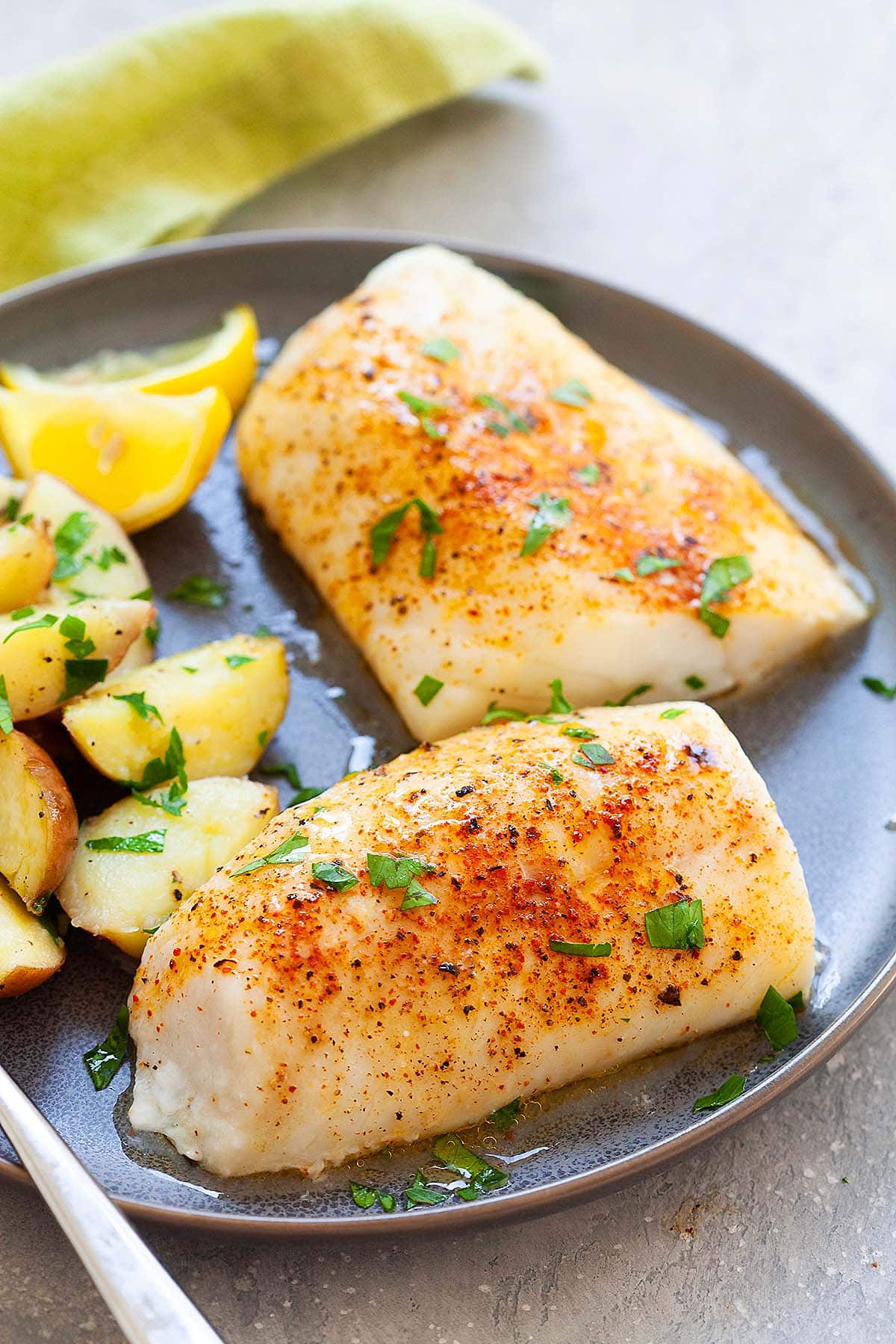
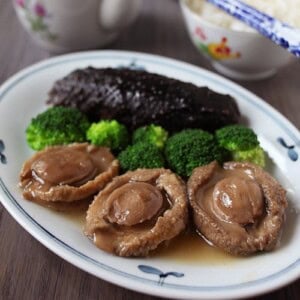
Braised Abalone with Sea Cucumber
Ingredients
- 4 dried South African Abalone
- 2 dried South African Deep Sea Cucumber
- 1 knob ginger, pounded
- 3 stalks scallion, roots removed
- 8 dried Japanese scallop, rinsed with water before using
- 4 oz (125g) broccoli florets
- Cornstarch + water
Supreme Chicken Stock:
- 1 stewing hen, skin removed and chop into big pieces
- 1 lb (500g) pork spare ribs, cut into riblets
- 4 oz (125g) Chinese ham (or Virginia ham), cut into pieces
- 5 quarts water
Instructions
- Soak the dried abalone in cold water for 24 hours. The next day, clean it thoroughly and cook in boiling water for 15 minutes. Turn off the heat, cover the pot, and let it sit until the water cools. Clean the abalone again, remove the tail end, discard any impurities, and soak in clean cold water for another 10 hours or overnight.
- Meanwhile, soak the sea cucumbers overnight in a clean, oil-free pot. The next day, bring a large pot of water to a boil. Turn off the heat and add the sea cucumbers. Cover the pot and let them sit until the water cools. Repeat this process 3-4 times until the sea cucumbers are relatively soft. At this point, clean each sea cucumber as shown in the pictures.
- Bring a pot of water to a boil, preferably in a stainless steel pot. Add the ginger, scallions, and sea cucumbers, and cook on low heat until the sea cucumbers are soft enough for further preparation.
- While preparing the dried ingredients, make the Supreme Chicken Stock. Bring water to a boil in a deep stock pot. Add the chicken, ribs, and ham, and return to a boil. Lower the heat and simmer for 8 hours, until the meat falls off the bones and the stock is very flavorful. Discard the solids and save the stock. You can keep it in the fridge.
- When you're ready to cook, use a smaller stock pot and add 3-4 cups of Supreme Chicken Stock, along with the abalone, sea cucumbers, and scallops. Bring to a boil, then reduce to low heat and simmer for 10 to 12 hours, until the abalone is tender and absorbs the flavors of the stock.
- To check for doneness, use a chopstick to poke the ingredients. Since sea cucumbers cook faster than abalone, check their texture often. Once the sea cucumbers are soft and jiggly, remove them from the pot and set aside. Add them back and reheat just before serving. Do not overcook the sea cucumbers, as they will turn into a gel-like texture.
- To serve, quickly blanch the broccoli florets in boiling water. Drain and set aside. Use some of the soup base and thicken it with a bit of cornstarch mixed with water. Arrange the abalone, sea cucumbers, and broccoli on a serving plate, then drizzle the thickened sauce on top. Serve immediately.
Notes
Nutrition
Nutrition information is automatically calculated, so should only be used as an approximation.
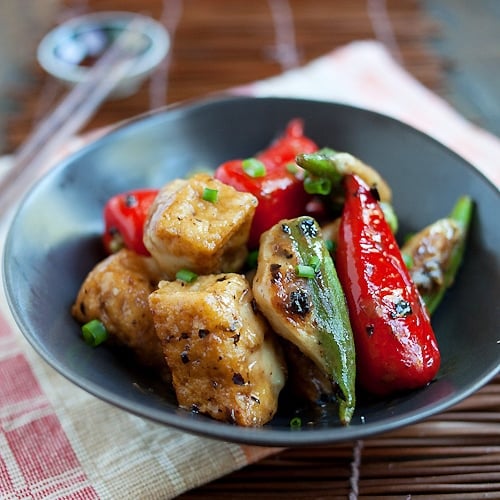
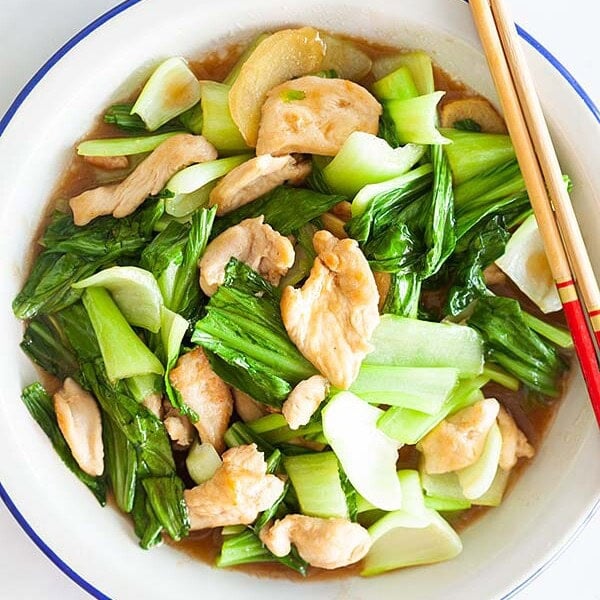
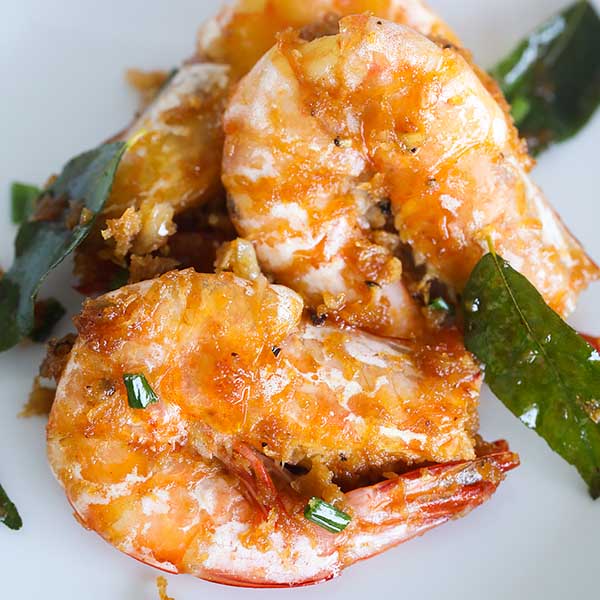
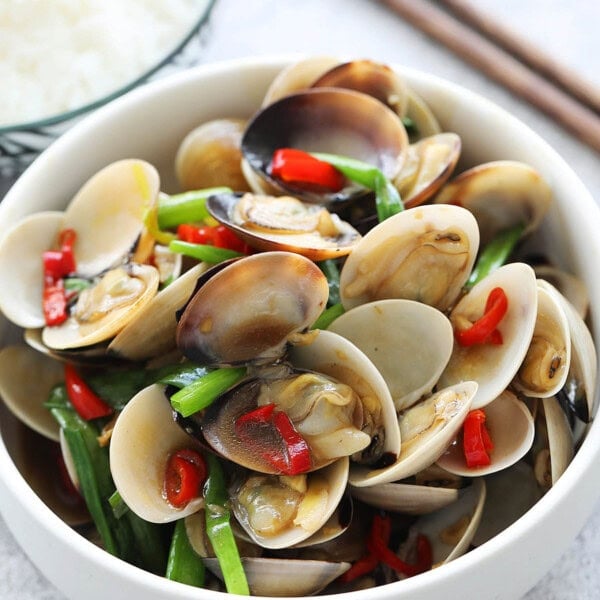






I appreciate, cause I found just what I was looking for. You have ended my four day long hunt! God Bless you man. Have a nice day. Bye
We have dried abalone and sea cucumber for sale. We have built up decades of experience trading both domestically and overseas with our partners in Africa.
We only supply dried products from wild caught abalone and does not use chemical additives or drying machines. We source our products from local fishermen in Cameroon’s Antlantic coastal towns of Kribi and Limbe where the market has just recently started to boom. We operate an Abalone farm in Limbe, South West Region of Cameroon
You can email me if you’re interested: vivikar75@outlook.com
what is the specific name of a stewing chicken? 1 quart = ? ml (water)
Thank you
Entasked with this dish coming cny eve. First time for me, newly married so hope this turns out well for the parents-in-law. *Fingers crossed! Thanks for the recipe.